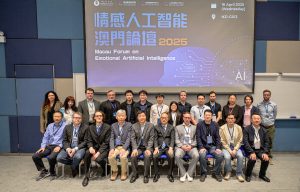The Institute of Collaborative Innovation (ICI) of the University of Macau (UM) held the first Macau Forum on Emotional Artificial Intelligence on 16 April 2025. The forum brought together renowned scholars from the fields of computer science, robotics, cognitive neuroscience, linguistics, communication studies, and psychology, who presented the latest advancements in affective computing and emotion-aware artificial intelligence (AI), and explored how innovative technologies can detect human emotions through verbal, non-verbal cues, and even brain signals. Around 200 people attended the forum.
In his speech, UM Rector Yonghua Song said that the forum would serve as an important platform for interdisciplinary collaboration and innovation in emotional AI, and enhance human-AI interaction through shared insights. He also noted that with the advancement of technology, emotional AI is playing an increasingly important role in promoting mental well-being by providing emotional support. Research in this area is attracting increasing attention and will have an even greater impact on social life in the future.
The forum addressed practical computational, philosophical, and ethical challenges in developing emotion-aware AI systems to enhance human-AI interactions. A list of keynote speakers spoke at the forum. Erik Cambria, professor at Nanyang Technological University, presented various academic and industrial research on sentiment analysis and affective computing. Lu Bao-Liang, professor in the Department of Computer Science and Engineering at Shanghai Jiao Tong University, discussed multimodal emotion detection and affective brain-computer interfaces. Hu Bin, dean of the School of Medical Technology at Beijing Institute of Technology, shared insights into affective AI for diagnosis and treatment of mental disorders. Johan F. Hoorn, professor in the Department of Computing at The Hong Kong Polytechnic University, explored emotional AI models for the development of innovative and socially sensitive robots. Huang Minlie, deputy director of the Foundation Model Research Center at Tsinghua University, examined how large language models can enhance the social and emotional intelligence of AI. The following UM scholars also presented their research findings at the forum: Xu Cheng-Zhong, dean of the Faculty of Science and Technology (FST); Christian Montag, associate director of ICI; Michiel Spapé, associate professor in the Centre for Cognitive and Brain Sciences (CCBS); Wu Haiyan, assistant professor in CCBS; Steven Morad, assistant professor in FST; and Zhong Junwen, assistant professor in FST.
ICI is dedicated to promoting interdisciplinary research among higher education institutions in the Guangdong-Hong Kong-Macao Greater Bay Area and beyond, cultivating innovative talent, creating an environment conducive to innovative thinking, innovative capabilities, and innovative industries, and fostering industry-academia collaboration. The forum exemplified ICI’s commitment to achieving its objectives by bringing together experts to discuss the latest trends and challenges in emotional AI, and facilitating discussions and exchanges among scholars.
| Source: Institute of Collaborative Innovation | |
| Media Contact Information: | |
| Communications Office, University of Macau | |
| Albee Lei | Tel: (853) 8822 8004 |
| Jason Leong | Tel: (853) 8822 8322 |
| Email: | prs.media@um.edu.mo |


